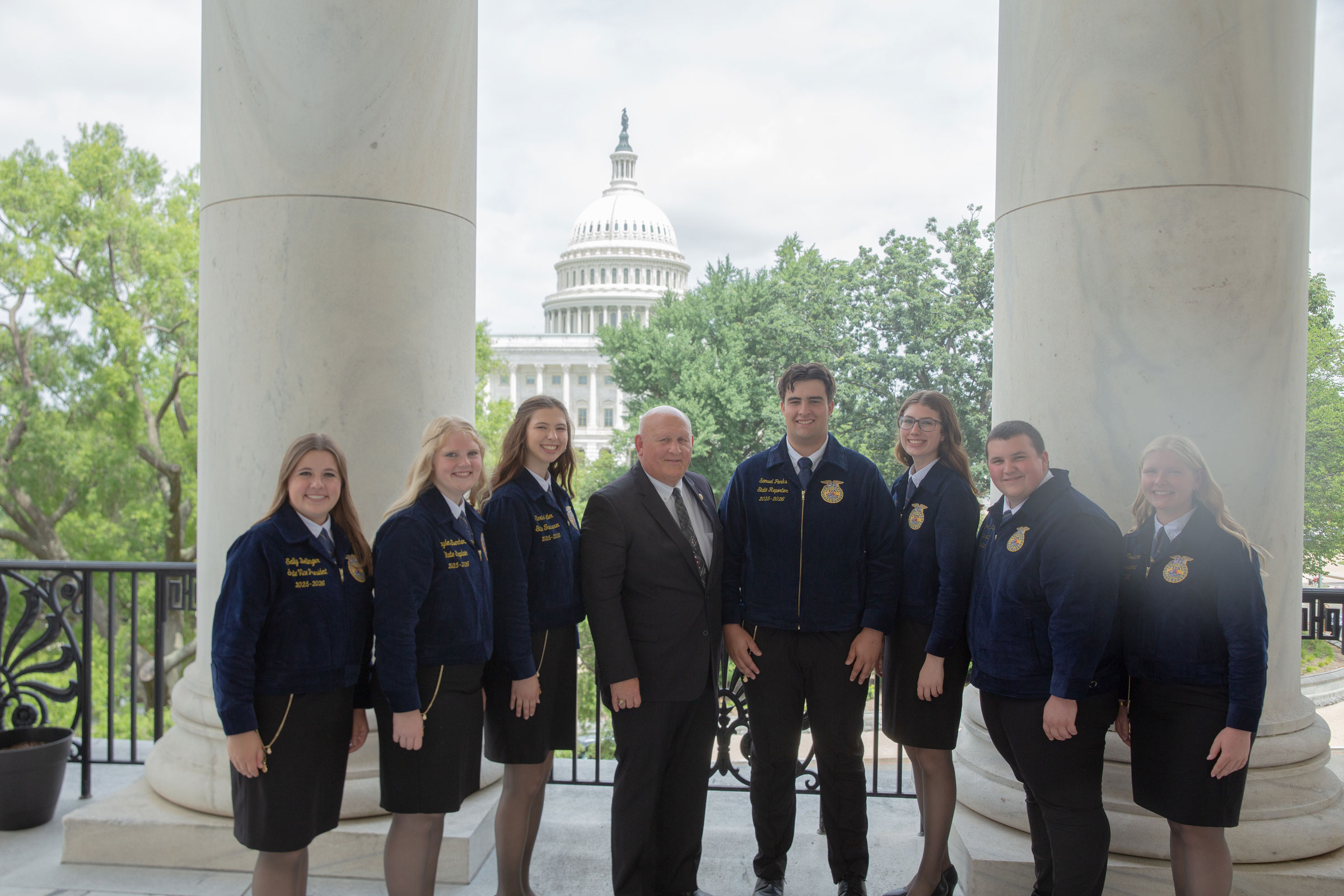Interviews & Profiles
A Q&A with U.S. Rep. Glenn “GT” Thompson
The chair of the powerful House Agriculture Committee on why the One Big Beautiful Bill is great for Pennsylvania agriculture, his plans for immigration reform and what makes commonwealth farming special.

U.S. Rep. Glenn “GT” Thompson is the longest-serving member of Pennsylvania’s congressional delegation. TOM WILLIAMS/CQ-ROLL CALL, INC VIA GETTY IMAGES
This conversation has been edited and condensed for length and clarity.
The longest-serving member of Pennsylvania’s congressional delegation, U.S. Representative Glenn “GT” Thompson, has represented a vast swath of rural Central Pennsylvania since 2009; following a 2018 redistricting, his 15th Congressional District covers 18 counties, a sparsely populated but agriculturally dense third of the state’s landmass.
Thompson spoke with City & State about the state of Pennsylvania agriculture, how the One Big Beautiful Bill will impact farmers and other Pennsylvanians, immigration reform and more.
How has your job – and Congress – changed since you first took office?
In both parties, the extremes – the folks on the far right and far left – they’ve increased their influence, partly thanks to social media and 24-hour cable news. Congress is still doing great bipartisan work; we just have to work a little harder at it.
For instance, as Agriculture Committee chair, I have responsibility for crypto, because cryptocurrency tokens are traded as a commodity. The oversight is by the Commodities Future Trading Corporation – so nothing I ever thought I would have to work with when I became the agriculture chair! But we did just make history with that first main piece of cryptocurrency legislation. (Congress passed the GENIUS Act, the first major piece of U.S. cryptocurrency legislation, in mid-July, and at press time was advancing the Clarity Act, which would further provide a regulatory framework considered favorable to the industry.)
The pathway to get to that was a little harder than it would have been years ago. It takes maybe a little more work, a lot more finesse in terms of communication skills, but that was a great example of how we’re still getting it done.
What challenges or concerns are most pressing for PA agriculture?
Farmers have been really suffering over the past four years, and it has just spiraled because of inflation. You have to remember, a lot of times it gets dictated to them – what they get paid for, what they grow – and then there are input costs, the agritools and agrichemicals that they need. There have been significant challenges that resulted in the worst farm economy, not just in Pennsylvania, but across the nation, in 50 years. We saw a lot of bankruptcies … And of course, farming is always at risk due to weather – too little rain, too hot, too dry, too cold.
Our farmers have to go out and get a loan every year to buy what they need to plant a crop or raise a herd or flock. Quite frankly, things were so bad financially that most of the lenders weren’t able to, in good faith, lend any money … And without that extensive credit, we run into a food insecurity and an economic insecurity situation.
I fought hard with leadership, across the aisle and across the Capitol, and I was able to achieve a significant amount of money last December that really helped our farmers.
Gov. Josh Shapiro has drawn attention to the impact of cuts to nutrition programs on farmers – those who contract with food banks, for instance. Many in the nutrition sector have been sounding alarms over these cuts. How do you respond?
Well, they’ve been impacted, unfortunately, by a bunch of lies. This is an issue I take personally, because I’m responsible for nutrition; nutrition is very, very important. There were no cuts to nutrition. The amount of resources going to our food banks or food pantries through the Farm Bill (part of the OBBB), through the Agriculture Committee – those are authorized by law. We’re not decreasing the amount of resources that are going out to families living at or near poverty, that are on the Supplemental Nutrition Assistance Program. This is once again, unfortunately, political slander.

But I love it when people ask the question, because I get a chance to explain. I know the governor was not happy that I called him out; he’s done the worst job of managing the SNAP nutrition program than probably any previous governor, because of Pennsylvania’s state payment error rate. (Editor’s note: That figure measures how accurately states determine eligibility for SNAP and allot benefits.)
Two years ago, Pennsylvania’s error rate was 17%. Last year it was nearly 11% – that number just came out from the U.S. Department of Agriculture. This is a disservice to the taxpayers of Pennsylvania; Pennsylvania has had to pay tens of millions of dollars in fines to the USDA because of mismanagement. And we’re not the only state that’s done this – I’m not picking on the Keystone State (Editor’s note: the national error rate average was slightly higher than Pennsylvania’s). I believe in Pennsylvania, and I know that we can do better.
We set up a SNAP cost-sharing arrangement between the federal government and the state, because we needed to do something to incentivize states like Pennsylvania to do a better job. So we set a threshold: if you can get your error rate under 6%, there’s zero cost share, and if you can’t, then there will be a cost share. SNAP has never had a state share, and maybe that’s why we’re seeing these high error rates. What’s the old saying – that if you’re spending your own money, you’re more careful.
There are three groups of people that will lose their Medicaid or lose nutrition benefits under SNAP – they’ll get three months, and then it’ll stop. No. 1 is, if you’re here illegally, you’re not entitled to those programs. SNAP is a benefit for people that are here legally. No. 2, people will come off the SNAP program because they’ve worked their way off. What a great thing, right? They keep climbing the ladder of opportunity and they don’t need SNAP – they’ve grown their way out of poverty. And one other category is someone who chooses not to comply with either an average of 80 hours a month of work, community volunteer service or career and technical education.
Honestly, I like to think the best of folks. I don’t think we have many people who’ll choose not to comply. But anybody that’s coming off will still be able to go to our food banks, which we fund through the Farm Bill – TFAP, the Emergency Food Assistance Program – so there’s still going to be some federal assistance. TFAP is very important to me, and I want to make sure that those monies will continue.
How does the OBBB benefit Pennsylvania agriculture?
This really is the strongest Farm Bill we’ve ever had. It’s the single largest investment in our families that produce food and fiber that we’ve had in a Farm Bill. There are provisions for the safety net, increased investment in research – science, technology and innovation, a doubling of trade assistance, making crop insurance more affordable and more versatile … animal disease prevention, vaccinations, support for veterinarians, support for our laboratories. And $155 million for land grant universities like Penn State, designated for building research facilities.

There’s considerable concern about the impact of immigration enforcement on the agricultural workforce. What’s the right balance?
I’ve been quoted when it came to doing raids on these farms specifically that they needed to knock it off … I recognize that somebody who’s here without status – they’re going to have to go home at some point. But we cannot create a void in our agricultural workforce in either production or processing, because if we do, that leads to food insecurity, and food insecurity leads to rural economic insecurity, which impacts the nation; food insecurity is national insecurity.
We have folks who are here legally who are concerned about getting swept up in some type of raid, and they’re not showing up for work. I’ve communicated that to the White House.
I put together the Agricultural Labor Working Group to address the needs of our agricultural workforce in the last Congress: eight Republicans, eight Democrats, two co-chairs. That’s not typical in Congress – normally, when you’re in the majority, you stack the deck in your favor, but I’m sincere about getting outcomes for the agriculture workforce. The group did a great job, and we’re putting their recommendations into legislative form, which we’ll probably introduce in September. This will modernize the H2A program, which permits U.S. employers to hire temporary, seasonal or agricultural workers.
These folks are not taking jobs from American citizens. The requirements under the work system – employers have to advertise to make sure there are no U.S. citizens out there who will take the jobs. And I can tell you, they spend a lot of money without any results.
NEXT STORY: This week’s biggest Winners & Losers
